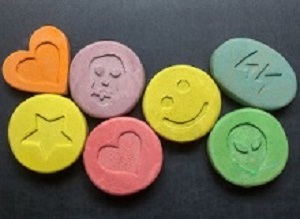 If you’ve ever seen someone in a club on MDMA – also known as ‘ecstasy’ or ‘molly’ – it may not surprise you to hear it’s linked to a heightened ability to share other people’s feelings and emotions. In our study, we found that even when the effects have faded, mild MDMA users showed greater empathy than people who use other common recreational drugs, such as cannabis, cocaine and ketamine, writes Molly Carlyle of the University of Exeter in The Conversation.
If you’ve ever seen someone in a club on MDMA – also known as ‘ecstasy’ or ‘molly’ – it may not surprise you to hear it’s linked to a heightened ability to share other people’s feelings and emotions. In our study, we found that even when the effects have faded, mild MDMA users showed greater empathy than people who use other common recreational drugs, such as cannabis, cocaine and ketamine, writes Molly Carlyle of the University of Exeter in The Conversation.
MDMA is used in rave culture because it increases energy and makes people feel euphoric and sociable. Recently, though, researchers have been looking at how the pure form of MDMA can be used in therapy to treat mental health problems such as post-traumatic stress disorder, alcohol addiction and more.
Recent trials have shown that when used alongside psychotherapy, MDMA can treat post-traumatic stress in people who have not responded to any other treatments, and these improvements can still be seen many months after treatment. It is thought that the effect of MDMA enables patients to think about very difficult memories that are often too painful to address, helping them to recover.
Other researchers have been looking at how MDMA can be used to help autistic people by reducing social anxiety and increasing social adaptability. MDMA-assisted psychotherapy also has been suggested to help with addictions, such as alcoholism.
Longer-term effects
But little research has investigated the longer-term impact of using MDMA on how we get on with other people. It’s important to understand this if we’re looking to use the drug in a therapeutic setting, as most psychological disorders involve difficulty in interacting with others.
We also found in our study that mild MDMA users were no more distressed than alcohol users after being socially excluded, contrary to previous concerns that MDMA use would heighten social distress and anxiety in the long term.
Our study involved 67 young people, 25 of whom used MDMA, 19 who used other drugs and 23 who only used alcohol.
We assessed empathy by using a questionnaire and a computer task. In the questionnaire, the MDMA users rated higher in empathy and sympathy for others (known as “emotional empathy”) than the other drug users, who mainly used cannabis, cocaine and ketamine.
During the computer task, the MDMA users were also better at correctly identifying the emotions of others (known as “cognitive empathy”).
The MDMA users in our study used MDMA about once a month. This level of use is about the same as what could be used for therapy, so looking at this group is more informative than looking at heavy users to figure out the longer-term effects of MDMA as a treatment.
But the people in this group were recreational users, meaning they bought MDMA off the street. Street MDMA is often contaminated with other substances, so it can vary in purity. In a therapeutic setting, MDMA would be used in its pure form. Alongside psychotherapy, patients would be given a standard dose in a controlled setting and would be closely monitored and guided by a therapist.
The findings from our study do not mean that using MDMA makes people more empathetic as it is highly possible that more empathetic people who use drugs are drawn to MDMA due to its sociable effects (meaning that there could be preexisting differences in empathy).
To truly see whether MDMA can increase empathy in the long term, a study would need to assess people before using drugs and would need to look at changes in empathy over time.
Nevertheless, this study is important because understanding the longer-term effects of using MDMA is pivotal in determining whether it can be used as a viable treatment for mental health disorders.
*Molly Carlyleis a PhD Candidate, Addiction and Psychopharmacology, at the University of Exeter.
Greater empathy in MDMA users
Journal of Psychopharmacology, March 2019.
Authors
Molly Carlyle, T Stevens, L Fawaz, B March, S Kosmider and CJ Morgan
Abstract
3,4-Methylenedioxymethamphetamine (MDMA) is widely known for its positive acute effects on social behaviour, such as increasing empathy, whilst also attenuating the negative impact of social exclusion. However there is a scarcity of research that investigates the long-term impact of recreational MDMA use on these fundamental social processes.
Method
Sixty-seven individuals were split into three groups based on their drug-use history: poly-drug MDMA users ( n = 25), poly-drug users who do not use MDMA ( n = 19), alcohol-only users ( n = 23), and were tested in an independent groups design. Participants completed both a self-report measure of emotional and cognitive empathy, along with the Multifaceted Empathy Task – a computerised assessment of empathy – and the Cyberball Game – a social exclusion paradigm.
Results
MDMA users had significantly greater subjective emotional empathy, and greater cognitive empathy on the computer task compared with the poly-drug users who do not use MDMA. There were no significant differences in subjective responses to social exclusion between the groups. Indices of MDMA use did not correlate with empathy.
Conclusions
Long-term MDMA users in this sample exhibited normal psychosocial functioning in regard to empathy and social pain and had higher subjective emotional empathy. This conflicts with previous suggestions that moderate, long-term MDMA use may cause heightened social distress, and is further evidence of the safety of the drug, which is relevant to considerations of its therapeutic use.
[link url="https://theconversation.com/ecstasy-users-are-more-empathetic-than-those-who-take-other-drugs-even-when-not-on-it-111409"]Ecstasy users are more empathetic than those who take other drugs – even when not on it[/link]
[link url="https://www.ncbi.nlm.nih.gov/pubmed/30717615"]Greater empathy in MDMA users[/link]
